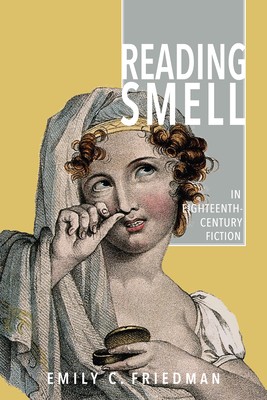
- We will send in 10–14 business days.
- Author: Emily C Friedman
- Publisher: Bucknell University Press
- ISBN-10: 1684484804
- ISBN-13: 9781684484805
- Format: 15 x 22.8 x 1.4 cm, minkšti viršeliai
- Language: English
- SAVE -10% with code: EXTRA
Reviews
Description
New in paperback! Scent is one of our strongest ties to memory. Scent is also both an essential and seemingly impossible-to-recover aspect of material cultural. While other intangibles of the human experience have been examined in the context of the eighteenth-century novel, scent has so far remained largely sidelined in favor of the visual, the aural, touch, and taste. Incorporating wide-scale research and focused case studies from among the most striking or prevalent uses of olfactory language in eighteenth-century British prose fiction, Friedman examines how the recovery of forgotten or overlooked sensory information might reshape our understanding of these texts. By highlighting scents and their shifting meanings across the period--bodies, tobacco, smelling-bottles, and sulfur--Reading Smell not only provides new insights into canonical works by authors like Swift, Smollett, Richardson, Burney, Austen, and Lewis, but also sheds new light on the history of the British novel as a whole.
EXTRA 10 % discount with code: EXTRA
The promotion ends in 22d.14:14:50
The discount code is valid when purchasing from 10 €. Discounts do not stack.
- Author: Emily C Friedman
- Publisher: Bucknell University Press
- ISBN-10: 1684484804
- ISBN-13: 9781684484805
- Format: 15 x 22.8 x 1.4 cm, minkšti viršeliai
- Language: English English
New in paperback! Scent is one of our strongest ties to memory. Scent is also both an essential and seemingly impossible-to-recover aspect of material cultural. While other intangibles of the human experience have been examined in the context of the eighteenth-century novel, scent has so far remained largely sidelined in favor of the visual, the aural, touch, and taste. Incorporating wide-scale research and focused case studies from among the most striking or prevalent uses of olfactory language in eighteenth-century British prose fiction, Friedman examines how the recovery of forgotten or overlooked sensory information might reshape our understanding of these texts. By highlighting scents and their shifting meanings across the period--bodies, tobacco, smelling-bottles, and sulfur--Reading Smell not only provides new insights into canonical works by authors like Swift, Smollett, Richardson, Burney, Austen, and Lewis, but also sheds new light on the history of the British novel as a whole.


Reviews